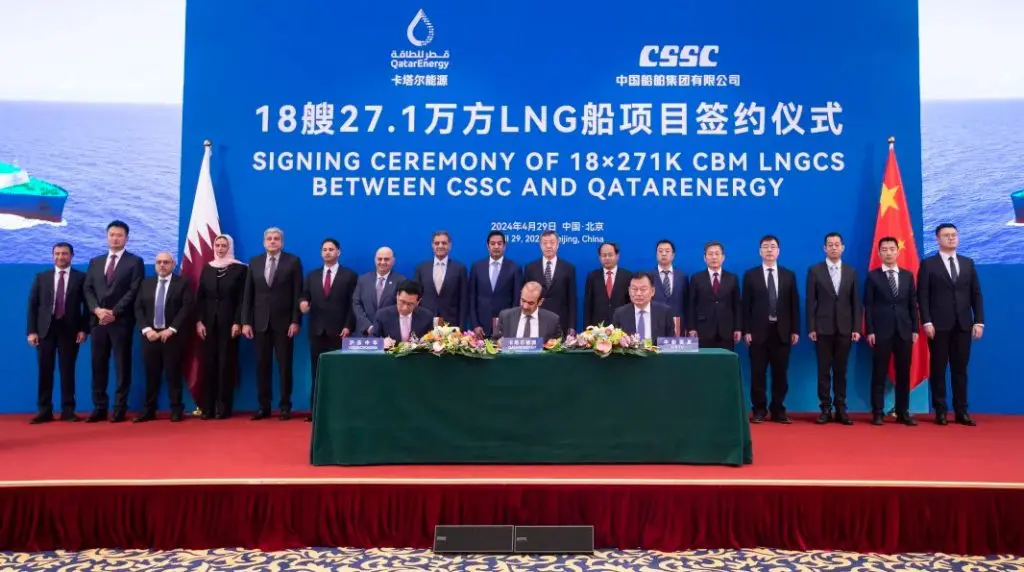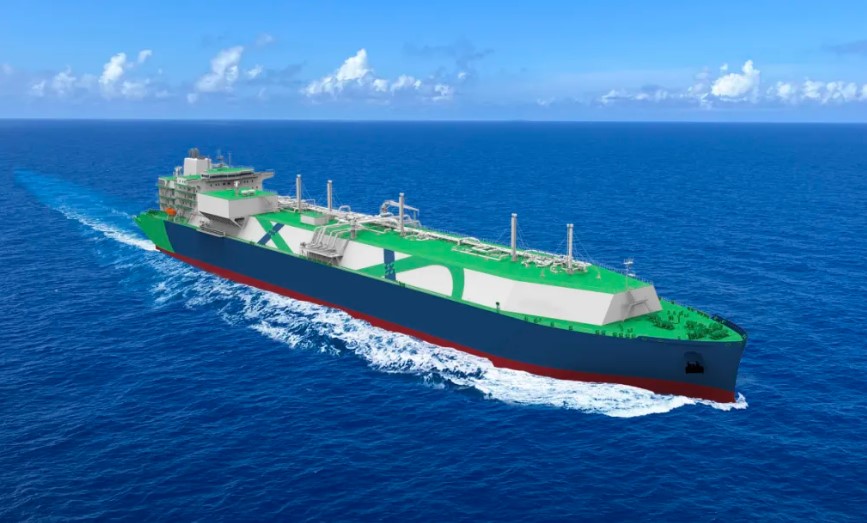State-owned LNG giant QatarEnergy has signed a major shipbuilding deal worth $6 billion with China State Shipbuilding Corp for the construction of 18 271,000-cbm LNG carriers. The vessels will be built by CSSC’s Hudong-Zhonghua.
The contract was signed on Monday in Beijing, according to a statement by CSSC.
CSSC claims this is the world’s largest single shipbuilding order.
Each of the world’s largest LNG vessels will be 344 meters long, 53.6 meters wide, and will have a draft of 12 meters, according to CSSC.
Also, the vessels feature WinGD dual-fuel propulsion, a reliquefaction system, an air lubrication system, and GTT’s NO96 Super+ containment tech. The vessels have five storage tanks.
CSSC did not reveal the price tag of the deal or the delivery dates of the vessels.
In January, LNG Prime was the first to report that QatarEnergy has signed a shipbuilding deal with Hudong-Zhonghua for the construction of eight giant carriers.
Last month, this publication reported, citing sources, that QatarEnergy has selected shipowners to own and operate 18 LNG carriers as part of its massive shipbuilding program.
Sources said at the time that the deals are expected to be finalized “soon”.
QatarEnergy has selected compatriot Nakilat to own and operate nine of these vessels, China Merchants Energy Shipping (CMES) will own four, Shandong Marine will own three, and China LNG Shipping (CLNG), a joint venture of Cosco Shipping and China Merchants will own two of these ships.
Nakilat currently owns 14 Q-Max LNG carriers built by Hanwha Ocean (DSME) and Samsung Heavy between 2008 and 2010, and they all transport LNG from the giant Ras Laffan LNG complex in Qatar to customers around the globe.

Deliveries between 2028 and 2031
QatarEnergy said in a statement later on Monday that the entire order is worth almost $6 billion.
This puts the price tag for each vessel at about $333 million.
The LNG giant said the new vessels will be QC-Max not Q-Max.
Eight of the 18 QC-Max size LNG vessels will be delivered in 2028 and 2029, while the other ten will be delivered in 2030 and 2031, it said.
Charter deals
QatarEnergy also said in a separate statement it has signed long-term time charter party (TCP) agreements with three ship owners for the operation of nine QC-Max vessels.
The long-term TCP agreements cater for the operation of the vessels by affiliates of China Merchants Group, Shandong Marine Group, and China LNG Shipping (Holdings) Limited, it said.
CMES will operate four vessels, Shandong Marine Energy three, and CLNG two, QatarEnegy said.
With this, QatarEnergy confirmed the previously mentioned report by LNG Prime.
The remaining deal is with Nakilat for nine vessels.

122 vessels
QatarEnergy said this new order marks a “significant addition to its historic LNG fleet expansion program.”
Including the giant LNG carriers, QatarEnergy’s massive shipbuilding program now includes the construction of 122 vessels.
QatarEnergy recently said it has completed the conventional sizes vessels portion of the shipbuilding program, bringing the total number of ships for which it signed time charter parties to 104 vessels.
These 104 vessels will be built by South Korean yards and Hudong-Zhonghua.
Under the program, HD Hyundai Heavy Industries will build 34 174,000-cbm LNG carriers, Samsung Heavy will build 33 vessels, Hanwha Ocean will build 25 vessels, and Hudong-Zhonghua will construct 12 ships.
As per owners of the 174,000-cbm carriers, Nakilat will own 25 ships, a joint venture between H-Line Shipping, SK Shipping, and PanOcean 15 vessels, while J.P. Morgan’s Global Meridian will own 14 ships.
Moreover, a JV between NYK Line, K Line, MISC, and China LNG shipping will own 12 vessels, Knutsen 10 vessels, a JV between MOL and Cosco Energy 7 vessels, CMES and Shandong Marine will each own 6 vessels, a JV between K Line and Hyundai Glovis 4 vessels, MISC 3 vessels, and TMS Cardiff Gas 2 vessels.
North Field expansions
The shipbuilding program aims to support and meet future requirements of QatarEnergy’s North Field East and North Field South expansion projects, as well as the Golden Pass LNG project in the US.
In addition, part of the program is intended to cater for replacement requirements of the existing Qatar LNG fleet.
The first phase of the North Field expansion project will increase Qatar’s LNG production capacity from 77 to 110 Mtpa, while the second phase will further boost capacity to 126 Mtpa.
Besides these projects, QatarEnergy also recently announced the third North Field expansion phase to boost Qatar’s capacity to 142 mtpa.
Two of China’s national energy companies are partners in Qatar’s North Field expansion projects with Sinopec acquiring a 1.25 percent interest in the North Field East project and a 1.875 percent interest in the North Field South project, while at the same time signing 27-year LNG sales and purchase agreements for a total of 7 mtpa.
CNPC in turn, has acquired a 1.25 percent interest in the North Field East project and signed a 27-year LNG sales and purchase agreement for 4 mtpa.
In 2023, Qatari LNG supplies to its main customers in China reached almost 17 million tons, the firm said.
(Article updated to include two statements by QatarEnergy.)

